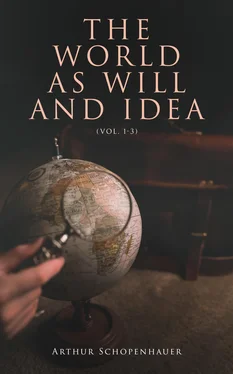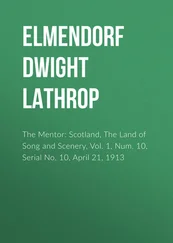But it must never be forgotten, in the investigation of all these analogies I have pointed out, that music has no direct, but merely an indirect relation to them, for it never expresses the phenomenon, but only the inner nature, the in-itself of all phenomena, the will itself. It does not therefore express this or that particular and definite joy, this or that sorrow, or pain, or horror, or delight, or merriment, or peace of mind; but joy, sorrow, pain, horror, delight, merriment, peace of mind themselves , to a certain extent in the abstract, their essential nature, without accessories, and therefore without their motives. Yet we completely understand them in this extracted quintessence. Hence it arises that our imagination is so easily excited by music, and now seeks to give form to that invisible yet actively moved spirit-world which speaks to us directly, and clothe it with flesh and blood, i.e., to embody it in an analogous example. This is the origin of the song with words, and finally of the opera, the text of which should therefore never forsake that subordinate position in order to make itself the chief thing and the music a mere means of expressing it, which is a great misconception and a piece of utter perversity; for music always expresses only the quintessence of life and its events, never these themselves, and therefore their differences do not always affect it. It is precisely this universality, which belongs exclusively to it, together with the greatest determinateness, that gives music the high worth which it has as the panacea for all our woes. Thus, if music is too closely united to the words, and tries to form itself according to the events, it is striving to speak a language which is not its own. No one has kept so free from this mistake as Rossini; therefore his music speaks its own language so distinctly and purely that it requires no words, and produces its full effect when rendered by instruments alone.
According to all this, we may regard the phenomenal world, or nature, and music as two different expressions of the same thing, which is therefore itself the only medium of their analogy, so that a knowledge of it is demanded in order to understand that analogy. Music, therefore, if regarded as an expression of the world, is in the highest degree a universal language, which is related indeed to the universality of concepts, much as they are related to the particular things. Its universality, however, is by no means that empty universality of abstraction, but quite of a different kind, and is united with thorough and distinct definiteness. In this respect it resembles geometrical figures and numbers, which are the universal forms of all possible objects of experience and applicable to them all a priori, and yet are not abstract but perceptible and thoroughly determined. All possible efforts, excitements, and manifestations of will, all that goes on in the heart of man and that reason includes in the wide, negative concept of feeling, may be expressed by the infinite number of possible melodies, but always in the universal, in the mere form, without the material, always according to the thing-in-itself, not the phenomenon, the inmost soul, as it were, of the phenomenon, without the body. This deep relation which music has to the true nature of all things also explains the fact that suitable music played to any scene, action, event, or surrounding seems to disclose to us its most secret meaning, and appears as the most accurate and distinct commentary upon it. This is so truly the case, that whoever gives himself up entirely to the impression of a symphony, seems to see all the possible events of life and the world take place in himself, yet if he reflects, he can find no likeness between the music and the things that passed before his mind. For, as we have said, music is distinguished from all the other arts by the fact that it is not a copy of the phenomenon, or, more accurately, the adequate objectivity of will, but is the direct copy of the will itself, and therefore exhibits itself as the metaphysical to everything physical in the world, and as the thing-in-itself to every phenomenon. We might, therefore, just as well call the world embodied music as embodied will; and this is the reason why music makes every picture, and indeed every scene of real life and of the world, at once appear with higher significance, certainly all the more in proportion as its melody is analogous to the inner spirit of the given phenomenon. It rests upon this that we are able to set a poem to music as a song, or a perceptible representation as a pantomime, or both as an opera. Such particular pictures of human life, set to the universal language of music, are never bound to it or correspond to it with stringent necessity; but they stand to it only in the relation of an example chosen at will to a general concept. In the determinateness of the real, they represent that which music expresses in the universality of mere form. For melodies are to a certain extent, like general concepts, an abstraction from the actual. This actual world, then, the world of particular things, affords the object of perception, the special and individual, the particular case, both to the universality of the concepts and to the universality of the melodies. But these two universalities are in a certain respect opposed to each other; for the concepts contain particulars only as the first forms abstracted from perception, as it were, the separated shell of things; thus they are, strictly speaking, abstracta; music, on the other hand, gives the inmost kernel which precedes all forms, or the heart of things. This relation may be very well expressed in the language of the schoolmen by saying the concepts are the universalia post rem, but music gives the universalia ante rem, and the real world the universalia in re. To the universal significance of a melody to which a poem has been set, it is quite possible to set other equally arbitrarily selected examples of the universal expressed in this poem corresponding to the significance of the melody in the same degree. This is why the same composition is suitable to many verses; and this is also what makes the vaudeville possible. But that in general a relation is possible between a composition and a perceptible representation rests, as we have said, upon the fact that both are simply different expressions of the same inner being of the world. When now, in the particular case, such a relation is actually given, that is to say, when the composer has been able to express in the universal language of music the emotions of will which constitute the heart of an event, then the melody of the song, the music of the opera, is expressive. But the analogy discovered by the composer between the two must have proceeded from the direct knowledge of the nature of the world unknown to his reason, and must not be an imitation produced with conscious intention by means of conceptions, otherwise the music does not express the inner nature of the will itself, but merely gives an inadequate imitation of its phenomenon. All specially imitative music does this; for example, “The Seasons,” by Haydn; also many passages of his “Creation,” in which phenomena of the external world are directly imitated; also all battle-pieces. Such music is entirely to be rejected.
The unutterable depth of all music by virtue of which it floats through our consciousness as the vision of a paradise firmly believed in yet ever distant from us, and by which also it is so fully understood and yet so inexplicable, rests on the fact that it restores to us all the emotions of our inmost nature, but entirely without reality and far removed from their pain. So also the seriousness which is essential to it, which excludes the absurd from its direct and peculiar province, is to be explained by the fact that its object is not the idea, with reference to which alone deception and absurdity are possible; but its object is directly the will, and this is essentially the most serious of all things, for it is that on which all depends. How rich in content and full of significance the language of music is, we see from the repetitions, as well as the Da capo, the like of which would be unbearable in works composed in a language of words, but in music are very appropriate and beneficial, for, in order to comprehend it fully, we must hear it twice.
Читать дальше












